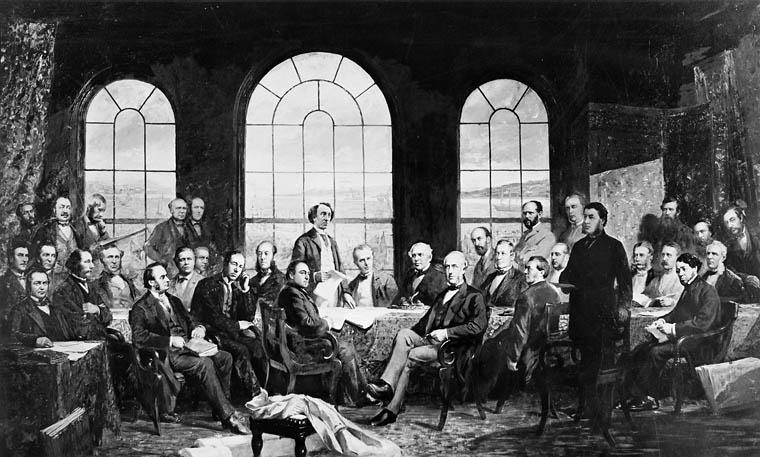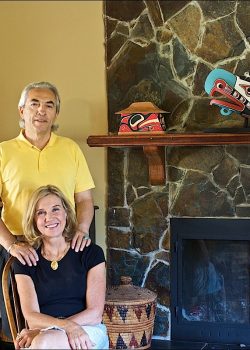
An incomplete picture. // "Fathers of Confederation" By Robert Harris
Reconciliation through Recognition lecture postponed
Phil Fontaine and Kathleen Mahoney are starting a movement to have Indigenous peoples officially recognized as founders of Canada
Update: This article originally referenced a lecture. Due to unavoidable circumstances, the lecture has been postponed and new date will be announced at a later time. Sorry for the inconvenience.
Three groups of people founded Canada. Only two, the British and the French, however, are officially recognized because they wrote the rules during Confederation.
The third group, Indigenous peoples, was left out, subjugated as wards of the state, says Phil Fontaine [BA/81, LLD/10], former National Chief of the Assembly of First Nations.
Fontaine and University of Calgary law professor Kathleen Mahoney are leading a movement called Recognition2Action that will ask Parliament to officially rewrite our origin story, acknowledging Indigenous peoples as founders.
Indigenous peoples’ founding role is inarguable. A few examples from a list of many, in brief: For hundreds of years Indigenous people were the backbone of the fur trade; they helped explorers survive and fought in the War of 1812; and Indigenous people signed the Treaties that gave access to land to, well, essentially everyone, making Canada one of the wealthiest nations in the world.
Changing the constitution could be cumbersome but Mahoney, the primary architect of the Truth and Reconciliation Commission of Canada (TRC) and the Chief Negotiator for Canada’s Aboriginal peoples claim for cultural genocide against Canada, said a quasi-constitutional change—like what the Canadian Human Rights Act, the Supreme Court Act, or Official Languages Act are—would achieve the same thing.
“No government would undo those pieces of legislation,” Mahoney says, noting it is a protection she would like for this cause. If the government officially recognized Indigenous peoples as founders in legislation, Mahoney argues it would create a framework within which all sorts of future decisions would be made – language, political representation, appointments, participation in the economy.
Such a change, Mahoney says, would also put Indigenous peoples in a position whereby they could be compared to British and French peoples, and comparative questions could then be asked about languages, laws, cultures, and how they are treated in the Canadian system.
“People will see everything as perfectly reasonable and normal. Right now people tend to think that when Aboriginal people get something it’s somehow a benefit or handout or favouritism. It’s a false premise,” she says. “This will be highly symbolic of course. But it will also be highly substantive in the sense that everything that is not symbolic, that is important and practical, will fit within this framework and the country will make sense of it going forward.”
Resolving our existential crisis
Thanks to the work of the TRC and the National Centre for Truth and Reconciliation at the U of M, and many other organizations across the country, Canada is experiencing a shift in consciousness and conscience.
Canadians are coming to grips with what their country did, Mahoney says, and it’s causing an existential crisis as Canadians wonder who we really are. The populace is facing the fact that the British and French turned their backs on the Indigenous Peoples they relied upon and then shortly after Confederation enacted the most pernicious piece of legislation in our history, the Indian Act. Then things got worse.
“When Canada was faced with the findings of the TRC, it caused a lot of people to question what this country is, and what it stands for. People now know more about the history of what happened and we are not the paragon of equality and human rights we have been lead to believe we are. In order to get over this existential crises acknowledging Indigenous peoples as founders is an essential next step. It will redefine the country,” Mahoney says.
It is also integral to Reconciliation, as noted in the TRC’s Calls to Actions (numbers 79 and 93).
“Some argue, ‘Well, you’ve had the apology. You’ve had compensation. That should be enough.’ There are people that would argue that’s Reconciliation,” says Fontaine, a Residential School Survivor.
“But of course, the commissioners pointed out that Reconciliation is a process that will take some considerable period of time to achieve. Take poverty. We’ve been struggling with poverty for generations and it should absolutely be tackled as a part of this. But I think, what underpins this all, in my view, is that this is the ultimate form of Reconciliation: Official recognition, in whatever shape of form that takes, of Indigenous peoples as one of the three founding peoples of Canada. That is what I’m focusing attention on.”
For too long Canada has told and read and celebrated an incomplete story, Fontaine says. No one likes half-finished stories.
Fontaine and Mahoney want Parliament to complete the story to make Canada whole.
“And the correct and powerful narrative of Canada’s origins will become part of the shared story of every Canadian for generations to come,” Fontaine said at a previous engagement on this Recognition2Action tour. “It will open up possibilities for genuine and lasting Reconciliation. Finally, it would be a moment for the ages, that all Canadians, including our peoples, could finally celebrate, in the true sense of the word, the founding of Canada. Our country.”








Just my first thought as I think of this rewriting of history. Native peoples helped both the English and French when they arrived in Canada, They fought in the wars of !812. I think they should be recognized aa a founding nation.
Have said that I don’t understand the legal ramifications. I am all for reconciliation and showing respect for their major contribution.
I fully support this movement. I have always believed it should be that way
A child is sacred. And when that child comes into the home, the family must welcome it. And if the child is happy and feels the want, he or she will come into this world very, very strong. And not to know this is to know nothing. Blackfeet saying
There has to be awareness of the past, acknowledgement of the harm that has been inflicted, atonement for the causes, and action to change. Should there be Canadians out there who would like to be part of any attempt to reconcile with any of Canada’s Indigenous peoples then it is expected that these Canadians would spend a little time and effort to learn something about those they wish to reconcile with.
If you think Canada’s Indigenous peoples are delighted, mainstream Canadians are feeling some relief from so much shame and guilt. Still so much of this stuff still lingers and will for the rest of our lives, so I suppose we, as Canadians, should seek ways to find even greater relief. Why not try learning more about the Indigenous peoples. We must find the courage to reach out and start the process of reconciliation.
I have noticed over the past ten years or so a deep-rooted sense of guilt being expressed in hundreds of my classrooms and other various learning situations. Canadians by the many thousands have expressed shock, dismay and shed many tears about what we as a society have done to Canada’s vulnerable and most undeserving victims. This is a very positive occurrence and I am grateful and encouraged. However as a people we have such a high and difficult mountain to climb before we find the peace we all seek.
Resistance comes in many forms such as; speaking out to the media and your political representatives, publishing memoirs, creating articles, posting blogs, letters to editors, creating works of art, writing songs and poetry, re-learning languages, learning about Canada’s Indigenous peoples and learn Canada’s true history.
Even a Christian god was called in to support the killing and theft of land via Manifest Destiny. These whitewashed histories are mostly devoid of a truthful perspective and those histories run contrary and are offensive to this nation’s proclaimed principles and threaten to expose the largest genocide the world has ever known – so they remain untaught today.
“All those governments, and all of those churches, for all of those years, misused themselves,” he said. “They hurt many children. They broke up many families. They erased entire communities. It will take seven generations to fix this. Seven. Seven is not arbitrary. This is far from over. Things up north have never been harder.” Gord Downie, The Tragically Hip
“The lack of funding and services, combined with poverty and despair, is this country’s greatest social injustice since the days of residential schools. All Canadians must demand that all levels of government recognize that First Nation children must have access to the same services as their own children.
There is a direct connection between the current child welfare system and the fact that far too many of our children either commit suicide, end up missing and murdered, or spend their young lives in prison. This federal government must also implement the TRC Calls to Action. We cannot lose another child. Canada’s greatest shame must end now.” Ontario Regional Chief Isadore Day
Kind regards,
Robert Laboucane
Director
Aboriginal Awareness Canada
http://www.AboriginalAwarenessCanada.com
403.620.3139
Aboriginal Awareness Canada Logo
I thoroughly enjoyed the read.